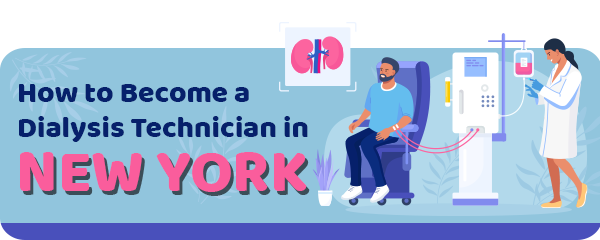The significance of dialysis machines and the professionals operating them cannot be understated, as they play a crucial role in extending the lives of many individuals.
Manipulating a dialysis machine may not seem glamorous, but it offers a rewarding career path for those who are passionate about helping others.
For a comprehensive understanding of this profession, keep reading.
Article Table of Contents
Dialysis Technician Job Description in New York
Choosing a career without a clear understanding of your duties can be unwise.
To begin, it’s essential to know that dialysis technicians primarily work with patients dealing with kidney issues.
Their primary responsibility is to ensure the dialysis machine functions effectively and operate it according to each patient’s specific needs.
Other key responsibilities in this profession include:
- Monitoring the vital signs of patients
- Assisting patients throughout the dialysis procedure
- Ensuring the safety and comfort of patients
- Reviewing patients’ medical history to identify potential concerns during the procedure
- Adjusting dialysis machines to suit individual patient needs
- Administering oxygen when necessary
- Basic Cardiopulmonary Resuscitation (CPR) if required
While these tasks represent some of the most common job duties of a dialysis technician, day-to-day responsibilities may vary.
Dialysis Technician Requirements in New York
In New York, individuals pursuing a career as a dialysis technician operate within the jurisdiction of the private sector.
New York does not impose stringent training and certification requirements for dialysis technicians.
Technicians must adhere to guidelines provided by the Centers for Medicare and Medicaid Services (CMS).
According to CMS, aspiring dialysis technicians must meet the following prerequisites:
- High school diploma or GED
- Training
- Credentialing
- Competency Standards of Practice
- Licensure or certification
- Gaining work experience
Certification should be obtained within 18 months of commencing employment.
Candidates can choose from several nationally recognized certification exams, including those offered by:
- The Nephrology Nursing Certification Commission (NNCC)
- The Board of Nephrology Examiners Nursing and Technology (BONENT)
- The National Nephrology Certification Organization, Inc. (NNCO)
New York’s guidelines for the profession include written and practical exams for candidates seeking certification.
Dialysis Technician Training Schools in New York
Dialysis technicians in New York are required to complete a formal training program before seeking employment in the field.
The first step is to graduate from high school or obtain a GED.
During high school, candidates should focus on subjects such as:
- Biology
- Chemistry
- Medical terminology
- Anatomy
- Physiology
The core training begins in post-secondary educational institutions, which may include vocational schools, community colleges, or technical institutes.
Students learn about:
- Principles of dialysis
- Care of patients with kidney failure
- Possible complications of dialysis
- Water treatment and dialysate preparation
- Infection control
- Safety Dialyzer reprocessing
Typically, it takes about a year to complete an appropriate training program.
The following institutions in New York offer approved dialysis technician courses:
New York Medical Career Training Center 
The course offered by this training center focuses on:
- Overview of hemodialysis
- Hemodialysis devices
- Canulation of vascular access
- Hemodialysis machines
- Dialyzer reprocessing
- Hemodialysis complication
- Vascular access
- Vital signs
- Water treatment
- Renal diet
- Infection control in dialysis units
- Principle of hemodialysis
- Hemodialysis procedure
- Documentation
- Reverse osmosis
The program offered by this school has 135 hours, and the school fees total $1,700.
This fee includes the books which cost $50.
Calhoun Community College 
Calhoun Community College presents a 50-hour comprehensive training program.
You have two options for program completion:
- Online Learning
- Classroom Instruction
The first option, priced at $1,299, includes e-books.
Completion of this program is expected within 6 months.
The classroom alternative, priced at $999, also covers the cost of textbooks.
Classes are scheduled for Mondays and Wednesdays, commencing at 6 p.m. for this option, but moving out of state is expected of New Yorkers interested in the class.
Please note that refunds are only applicable for in-person classes.
Auburn University 
Auburn University offers a fully online dialysis technician program.
The $3,000 tuition fee encompasses:
- Interactive learning modules,
- Various learning exercises,
- Access to career resources,
- Round-the-clock mentoring support,
- Opportunities for national and state certifications,
- Self-paced learning.
Students are expected to successfully complete their classes within a maximum duration of 6 months.
Alabama State University 
Alabama State University provides an online training program designed for the Certified Hemodialysis Technicians (CHT) exam offered by BONENT.
This means that students from other states can conveniently attend the program, but they should ensure it aligns with their state’s regulatory requirements.
The total tuition for this program is $4,190, and it can be paid in installments.
The program comprises 205 hours of coursework, which must be completed within 12 months, even when progressing at your own pace.
CPR training and certification are integrated into the course and are offered by the Red Cross.
Some of the course subjects include:
- The Cardiovascular System
- The Urinary System
- The Endocrine System
- The Reproductive System
- Infection Control
- Principles of Hemodialysis
| School Name | Address |
|---|---|
| New York Medical Career Training Center | 500 8th Ave Fl 5 New York, NY 10018 |
| Calhoun Community College | online |
| Auburn University | online |
Dialysis Technician Salary in New York
Understanding your potential income before pursuing a career is essential.
Dialysis technicians typically hold entry-level positions and earn an average salary of $46,900 annually.
For insights into cities in New York where salaries may be higher, please refer to the table below.
Annual Salary Range:| Location | Avg. Annual Salary |
|---|---|
| Arverne | $59,500 |
| Blauvelt | $59,000 |
| Armonk | $58,800 |
| Bellerose | $57,800 |
| Bayville | $57,700 |
| Ancramdale | $53,800 |
| New York | $51,700 |
| Huntington | $50,200 |
| Brentwood | $48,300 |
| New Suffolk | $47,700 |
Regional Salary in New York
| Region | Employed | Avg. Annual Salary | Avg. Hourly Pay | Top 10% Annual Salary | Bottom 10% Annual Salary |
|---|---|---|---|---|---|
| Albany-Schenectady-Troy, NY | 840 | $70,810 | $34.04 | $95,580 | $37,490 |
| Binghamton, NY | 190 | - NA - | - NA - | - NA - | - NA - |
| Buffalo-Cheektowaga-Niagara Falls, NY | 910 | $71,580 | $34.41 | $98,320 | $40,900 |
| Glens Falls, NY | 70 | $68,870 | $33.11 | $100,060 | $37,550 |
| Ithaca, NY | 100 | $70,300 | $33.8 | $97,640 | $38,000 |
| Kingston, NY | 50 | $61,120 | $29.39 | $107,020 | $35,970 |
| New York-Newark-Jersey City, NY-NJ-PA | 19,320 | $81,290 | $39.08 | $123,250 | $45,580 |
| Rochester, NY | 1,200 | $66,130 | $31.79 | $98,030 | $40,760 |
| Syracuse, NY | 480 | $69,940 | $33.62 | $100,610 | $36,360 |
| Utica-Rome, NY | 220 | $62,080 | $29.85 | $98,910 | $36,970 |
| Watertown-Fort Drum, NY | 30 | $69,990 | $33.65 | $97,400 | $42,020 |
* Employment conditions in your area may vary.
Frequently Asked Questions
Do I need a license or a certification to work as a dialysis technician in New York?
In New York, individuals only need a certification recognized at the national level if they want to work as dialysis technicians.
Which Other Skills Are Required for a Dialysis Technician in New York?
Dialysis techs must possess a series of skills and abilities.
These include:
- Attention to details
- Excellent communication
- Empathy
- Patience
- Compassion
- Technical mind
Where Does a Dialysis Technician in New York Find Work?
There are many different settings where a dialysis technician can find employment.
The following locations are the most common:
- Hospitals
- Dialysis centers
- Outpatient clinics
- Home healthcare agencies
Read the full guide: How to Become a Dialysis Technician




